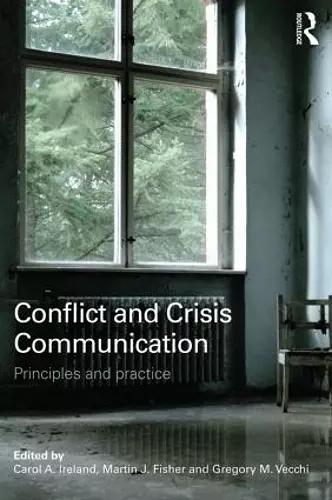Conflict and Crisis Communication
Principles and Practice
Martin Fisher editor Carol Ireland editor Gregory Vecchi editor
Format:Paperback
Publisher:Taylor & Francis Ltd
Published:26th Apr '11
Currently unavailable, and unfortunately no date known when it will be back
This paperback is available in another edition too:
- Hardback£145.00(9780415615112)

Conflict and crisis communication is the management of a critical incident which has the potential for resolution through successful negotiations. This can include negotiating with individuals in crisis, such as those threatening self-harm or taking individuals hostage as part of emotional expression, and also critical incidents such as kidnapping and terrorist activities.
By focusing on the empirical and strong theoretical underpinnings of critical incident management, and including clear demonstrations of the practical application of conflict and crisis communication by experts in the field, this book proves to be a practical, comprehensive and up-to-date resource. Discussion of relevant past incidents – such as the 1993 WACO siege in the United States – is used to enhance learning, whilst an examination of the application of critical incident management to individuals with mental disorder offers groundbreaking insight from clinicians working in this area.
Conflict and Crisis Communication is an excellent source of reference for national and international law enforcement agencies, professionals working in forensic settings, and also postgraduate students with an interest in forensic psychology and forensic mental health.
'In a society where we have an ever increasing expectation of instant gratification frustration can in the correct conditions easily transit through anger, on to aggression and into violence. It is perhaps therefore not surprising that those whose work brings us into contact with other human beings can find themselves dealing with aggressive or distressed behaviour somewhere on the crisis continuum.
Conflict and Crisis Communication: Principles and Practice examines in detail the management of the extreme end of the crisis continuum including those threatening self harm, barricade situations and hostage taking. This is a rare book not just in the specialist nature of the subject matter but in the fact that it carefully and successfully balances theory and practice. Ireland, Fisher and Vecchi draw on their own practical experience to ensure all theory links solidly to practical application.
In addition to examining several models of crisis negotiation the subjects of managing crisis with those suffering from mental illness and cognitive impairment and personality disorder are covered in detail with useful case examples in a range of contexts explored. It is refreshing and realistic to see these chapters containing useful guidance in constructing a framework in which to work collaboratively with the individual in crisis to achieve a peaceful outcome and avoiding using diagnosis to solely structure the negotiation process.
A chapter is devoted to the lesser discussed important subject of ethical considerations within a conflict and crisis situation. Once again the text effectively links theory to practice and encourages the reader to consider issues that are likely to arise and potentially evolve and change as incidents progress.
Several high profile incidents are discussed in detail and the issue of when a critical incident goes wrong is explored suggesting helpful learning points including the role of the media and political pressure. Post incident issues are also examined contrasting post incident responses in the context of the current evidence base.
Conflict and Crisis Communication is an excellent resource for those working in specialist negotiation fields and those with experience in this area will recognise the relevance and value of this publication. However the theory and strategies discussed are also likely to be of benefit to anyone who deals with regular conflict in mental health care and forensic settings who can utilise these problem solving skills to prevent conflicts from escalating into crisis.'
Dr Alastair Black is Consultant Psychotherapist and Head of Psychological Therapies for the Police Rehabilitation and Retraining Trust in Northern Ireland. He is a Conflict Management and Physical Intervention Trainer and Psychological Consultant to the Police Service of Northern Ireland’s (PSNI) Hostage and Crisis Negotiation team.
ISBN: 9780415615129
Dimensions: unknown
Weight: 440g
240 pages